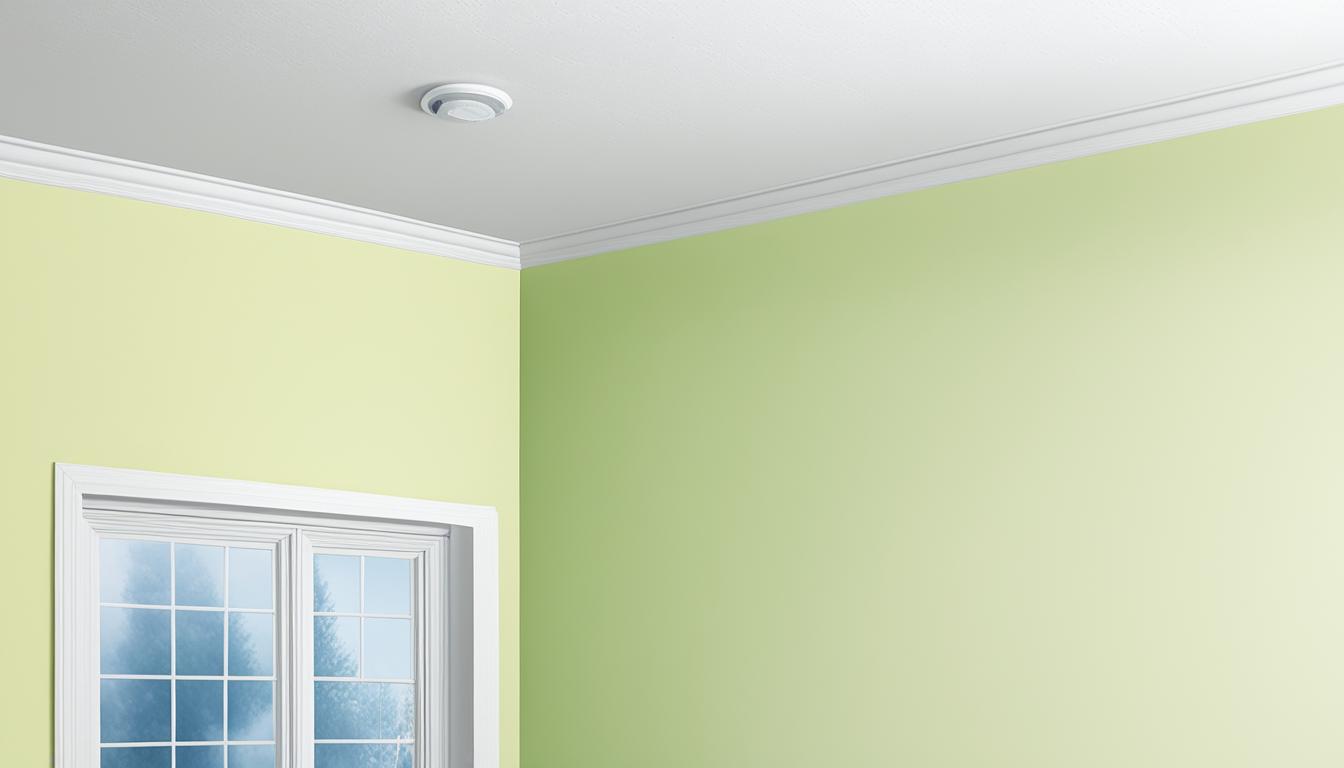
Musty House Smell Solutions, No Mold Detected
Is your house plagued by a musty odor, but you can’t find any mold? Don’t worry, you’re not alone. Many homeowners experience the frustration of dealing with a musty smell in their homes, even when no visible mold is present. The good news is that there are effective solutions to eliminate that unpleasant odor and create a fresher living environment.
In this section, we will explore practical methods to combat musty odors in your home, providing you with the knowledge and tools to eliminate the musty smell, even without mold. By understanding the causes of these odors and implementing the right strategies, you can enjoy a cleaner and more pleasant living space.
Key Takeaways:
- Musty odors can occur in homes even without visible mold.
- Proper ventilation is crucial in reducing musty smells.
- Identifying and eliminating moisture sources is essential.
- Cleaning and deodorizing techniques can significantly reduce musty odors.
- Odor absorbers and air fresheners provide temporary relief.
Understanding Musty Odors
Before we delve into solutions, it’s crucial to understand why your home can have a musty odor, even without visible mold. Musty odors can be a source of discomfort and can make your living environment unpleasant. While mold is often associated with musty smells, there are other factors that can contribute to the stale odor in your house.
Musty smells without mold can result from various causes, such as:
- Poor ventilation
- High humidity levels
- Moisture buildup
- Dampness
- Stagnant air
Inadequate ventilation can trap moisture and prevent fresh air from circulating, leading to a musty odor in your home. High humidity levels can also promote the growth of mildew and fungi, which can contribute to the stale odor.
Moisture buildup, whether from a leak, excessive condensation, or seepage, can create the ideal environment for mold and mildew to thrive. Even without visible mold, the presence of dampness and moisture can result in a musty smell.
Stagnant air can develop in areas of your home that are rarely accessed or poorly ventilated, such as basements, attics, and closets. Without proper airflow, the lack of circulation can lead to a stale odor.
By understanding these common causes, you can take the necessary steps to eliminate musty odors and create a fresh-smelling home environment. In the next sections, we will explore practical solutions to rid your house of musty smells, regardless of the presence of mold.
Proper Ventilation
Adequate ventilation is essential for removing musty odors from your home. Good airflow helps to circulate fresh air and prevent the buildup of stale, musty smells. In this section, we will explore the importance of proper ventilation and provide practical tips to help you improve the air quality in your home.
The Importance of Airflow
Proper airflow plays a crucial role in reducing musty odors. When air circulates effectively, it helps to remove stale air and bring in fresh air from outside. This constant exchange of air helps to eliminate musty smells and create a healthier environment.
Improving Ventilation Tips
- Open windows: Whenever possible, open windows to allow fresh air to flow into your home. This is especially beneficial on dry, sunny days.
- Use exhaust fans: Turn on exhaust fans in bathrooms, kitchens, and laundry rooms to expel moisture and prevent the buildup of musty odors.
- Clean air vents: Ensure that air vents and ducts are free from dust and debris, as clogged vents can restrict airflow and contribute to musty odors.
- Invest in air purifiers: Consider using air purifiers with HEPA filters to capture airborne particles, allergens, and odors, improving the overall air quality in your home.
By following these ventilation tips, you can reduce musty odors and create a fresher living environment. Keep in mind that proper ventilation is particularly important in areas prone to high humidity or dampness, such as basements, bathrooms, and laundry rooms.
Removing Stale Air
In addition to improving airflow, it’s crucial to effectively remove stale air from your home. Here are a few techniques to help you achieve this:
- Open doors: Allow air to flow freely throughout your home by keeping interior doors open.
- Use natural ventilation: Take advantage of natural ventilation by strategically placing windows or vents to create cross breezes.
- Use fans: Place fans in strategic locations to help move air and promote better circulation. Ceiling fans can be particularly effective.
- Consider air exchange systems: If your home lacks natural ventilation options, consider installing an air exchange system that removes stale air and introduces fresh air.
By implementing these strategies, you can effectively remove stale air and prevent the buildup of musty odors in your home.
Eliminating Moisture Sources
Excess moisture is often the main culprit behind that musty smell in your house, even without the presence of mold. To effectively eliminate the musty odor and create a fresher living environment, it is crucial to identify and eliminate potential sources of moisture. A combination of proactive measures can help you tackle this issue head-on.
Identifying Leaks
Check your house thoroughly for any signs of leaks. Leaky pipes, faucets, or roofs can result in moisture buildup, leading to a musty odor. Inspect your ceilings, walls, and flooring for damp spots or water stains. Addressing these leaks promptly will help prevent further moisture damage and eliminate the musty smell.
Controlling Dampness
Dampness can be a major contributor to the musty smell in your home. Areas such as basements, bathrooms, and laundry rooms are particularly susceptible to excess moisture. Take proactive measures to reduce dampness by ensuring proper ventilation in these spaces. Consider using dehumidifiers or installing exhaust fans to regulate humidity levels and prevent the musty odor from lingering.
Managing Humidity
High humidity levels can create a breeding ground for moisture, leading to musty odors. Invest in a hygrometer to measure the humidity levels in your home. Ideally, the humidity should be maintained between 30% and 50%. Use air conditioners, fans, or open windows to improve airflow and reduce moisture buildup. Additionally, keep an eye on areas prone to humidity, such as kitchens or bathrooms, and use absorbent materials like silica gel or moisture absorbers to control excess moisture.
Preventing Condensation
Condensation can contribute to the musty smell in your home. Take preventive measures to reduce condensation on windows, walls, and cold surfaces. Ensure proper insulation and seal any gaps or cracks that may allow moisture to seep into your home. Using ventilation fans while cooking or taking showers can also help minimize condensation.
Cleaning and Deodorizing Techniques
Musty odors can linger in your home, creating an unpleasant living environment. Cleaning and deodorizing are essential steps in eliminating musty smells and restoring freshness to your space. We’ve compiled effective techniques, natural deodorizers, and targeted tips to help you combat musty odors in specific areas of your home.
Tackling Musty Odors with Cleaning Techniques
To effectively remove musty odors, start by targeting the source of the smell. Thoroughly clean areas prone to moisture accumulation, such as bathrooms, laundry rooms, basements, and kitchen cabinets. Use a solution of vinegar and water or a commercial disinfectant to wipe down surfaces, including walls, floors, and countertops. Pay extra attention to corners, crevices, and areas with visible mold or mildew.
When cleaning fabrics, such as curtains, upholstery, and carpets, use a fabric cleaner or an enzyme cleaner specifically designed to combat musty odors. Follow the manufacturer’s instructions and test the product on a small, inconspicuous area first to ensure it won’t damage the material.
Natural Deodorizers for Musty Odor Removal
If you prefer using natural methods to eliminate musty smells, there are several options available:
- Baking soda: Sprinkle baking soda on carpets, rugs, and upholstered furniture. Let it sit for a few hours or overnight to absorb the odors, then vacuum thoroughly.
- Activated charcoal: Place activated charcoal in bowls or fabric pouches and position them in musty areas. Charcoal is known for its odor-absorbing properties and can help neutralize musty smells.
- Coffee grounds: Fill open containers with coffee grounds and leave them in areas with musty odors. Coffee acts as a natural deodorizer and can help eliminate unpleasant smells.
- Essential oils: Add a few drops of your favorite essential oil, such as lavender or tea tree oil, to a spray bottle filled with water. Mist the solution in musty areas for a refreshing scent.
Tips for Targeted Musty Odor Removal
Certain areas of your home are more susceptible to musty odors. Here are some targeted tips to address specific problem areas:
Basement: Improve ventilation by opening windows or using fans to circulate fresh air. Consider using a dehumidifier to reduce humidity levels. Remove any moldy or damp items and clean the area thoroughly.
Closets: Keep closets well-organized and ensure proper airflow by leaving a gap between clothes and walls. Use moisture-absorbing products, such as silica gel packets or hanging moisture absorbers, to prevent musty smells.
Bathrooms: Regularly clean and disinfect all surfaces, paying close attention to the shower, bathtub, and sink. Use a mold-resistant shower curtain and open windows or run exhaust fans to reduce moisture.

Implement these cleaning and deodorizing techniques to effectively combat musty odors in your home. By addressing the source of the smell, using natural deodorizers, and following targeted tips, you can create a fresher and more pleasant living environment for you and your family.
Odor Absorbers and Air Fresheners
When dealing with musty smells in your home, odor absorbers and air fresheners can provide temporary relief and help eliminate unpleasant odors. Whether you’re dealing with a musty odor in your basement, bathroom, or any other area of your house, these products can freshen the air and create a more pleasant living environment.
There are a variety of odor absorbers available on the market, each designed to target and neutralize specific odors. These products work by trapping and removing the odor molecules from the air, effectively eliminating the musty smell. Look for odor absorbers that are specifically formulated for musty odors or general household odors.
Types of Odor Absorbers:
- Baking soda: A simple and affordable solution, baking soda is known for its odor-absorbing properties. Place open containers of baking soda in areas with musty smells to absorb and neutralize odors.
- Charcoal: Activated charcoal is another effective option as it has a porous structure that allows it to absorb and trap odor-causing particles.
- Zeolite: Zeolite is a natural mineral that absorbs and neutralizes odors. It is often used in refrigerators but can also be effective in combating musty smells in other areas of your home.
In addition to odor absorbers, air fresheners can also help mask unpleasant smells and create a more pleasant atmosphere. However, it’s important to note that air fresheners provide temporary relief and do not eliminate the source of the odor. They can be used in conjunction with other odor-eliminating methods for a more comprehensive approach.
When choosing an air freshener, opt for ones that are specifically designed to combat musty odors. Look for fresheners with natural or mild scents that won’t overpower the space. Be sure to follow the instructions for proper use and placement to ensure the best results.
While odor absorbers and air fresheners can provide temporary relief, it’s essential to address the root cause of the musty smell to achieve long-term elimination. By combining these products with proper ventilation, moisture control, and thorough cleaning, you can effectively eliminate musty odors and enjoy a fresh-smelling home.
Professional Help and Prevention
Sometimes, addressing persistent musty smells in your home requires the expertise of professionals. If the musty odor persists or worsens, it is essential to consider the following options:
- Mold Assessments: Contact Fix Mold Miami at 305-465-6653 for a comprehensive mold assessment. Their team of experts can identify any hidden mold sources that may be causing the musty smell in your home.
- Prevention Strategies: Once the mold is detected and remediated, it’s crucial to implement prevention strategies to prevent the recurrence of musty odors. Fix Mold Miami provides tailored solutions to keep your home mold-free and fresh-smelling.
- Effective Remediation Techniques: In cases where mold is identified as the source of the musty smell, Fix Mold Miami offers effective remediation techniques to remove existing mold and prevent its growth in the future.
By seeking professional help from Fix Mold Miami, you can ensure a thorough assessment, proper prevention strategies, and effective mold remediation to eliminate musty odors in your home.

It’s important to note that professional assistance is recommended when dealing with persistent musty odors. The expertise and experience of professionals can provide a long-term solution to ensure a fresh and healthy living environment.
Common Mistakes to Avoid
To achieve long-term success in eliminating musty odors in your home, it’s important to be aware of common mistakes that can hinder your efforts. By avoiding these pitfalls and implementing the right strategies, you can maintain a fresh-smelling home. Here are some key things to keep in mind:
- Ignoring proper ventilation: One common mistake is neglecting the importance of proper airflow in your home. Insufficient ventilation can trap moisture and lead to musty odors. Make sure to open windows, use exhaust fans, and consider using a dehumidifier to improve indoor air quality.
- Neglecting regular cleaning: Failing to clean your home regularly can contribute to the buildup of dust, dirt, and other particles that can cause unpleasant odors. Regularly vacuuming, dusting, and washing surfaces can help eliminate stale odors.
- Not addressing moisture sources: Even if you don’t see visible mold, there may be hidden moisture sources that contribute to musty smells. Leaks, damp basements, or high humidity levels can create the perfect environment for mildew growth. Identify and fix these issues to prevent musty odors.
- Using ineffective air fresheners: While air fresheners can provide temporary relief, they often mask odors rather than eliminate them. Avoid relying solely on air fresheners and instead focus on addressing the root cause of the musty smell.
- Not maintaining proper humidity levels: High humidity can promote the growth of mold and mildew, leading to musty odors. Use a hygrometer to monitor humidity levels in your home and aim for humidity levels between 30% and 50%.
- Neglecting basement and crawl spaces: Basements and crawl spaces are prone to dampness and poor ventilation, making them ideal breeding grounds for musty odors. Regularly inspect and ventilate these areas to prevent musty smells from permeating your home.
Remember, addressing the underlying causes and maintaining a clean and dry environment is key to eliminating musty odors in your home. By avoiding these common mistakes, you can create a fresh-smelling living space for you and your family.
For more information and professional assistance in mold assessments, prevention, and remediation, contact Fix Mold Miami at 305-465-6653.
| Common Mistakes to Avoid | Effects on Musty Odor |
|---|---|
| Ignoring proper ventilation | Traps moisture and promotes musty smells |
| Neglecting regular cleaning | Buildup of dust and dirt contributes to stale odors |
| Not addressing moisture sources | Hidden moisture leads to musty odors |
| Using ineffective air fresheners | Only masks the odor temporarily |
| Not maintaining proper humidity levels | Promotes mold and mildew growth |
| Neglecting basement and crawl spaces | Creates ideal conditions for musty odors |
Conclusion
By implementing the solutions and recommendations outlined in this guide, you can successfully eliminate musty smells in your home, even if mold is not detected. Proper ventilation is crucial in reducing musty odors and improving the overall air quality in your living space. Make sure to improve airflow and remove stale air from your home by opening windows, using exhaust fans, or investing in a ventilation system.
In addition, eliminating moisture sources is essential to combat musty smells. Check for any leaks, dampness, or high humidity levels in your home, and take the necessary steps to fix them. Cleaning regularly and using deodorizers can also significantly reduce musty odors. Focus on specific problem areas, such as bathrooms, basements, and closets, where musty smells tend to linger.
While there are various odor absorbers and air fresheners available in the market, it’s important to remember that they offer temporary relief. For a more permanent solution, consider seeking professional help for mold assessments and prevention strategies. Fix Mold Miami is a reputable company experienced in tackling mold-related issues. You can contact them at 305-465-6653 for a comprehensive mold assessment.
Remember, maintaining a fresh-smelling home requires consistent effort and vigilance. Avoid common mistakes like neglecting ventilation, ignoring leaks, or relying solely on air fresheners. By addressing the root causes of musty smells and implementing preventive measures, you can enjoy a mold-free, fresh-smelling living environment, enhancing your quality of life and well-being.




